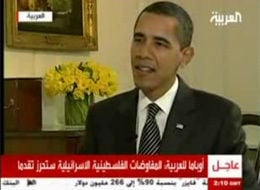President Obama is apparently working hard to keep his campaign pledges. He has now had his first interview with Al Arabiya, while repeating his promise to give a speech in a Muslim capital in the first 100 days of his administration. In some ways, President Obama's approach to the presidency feels like the campaign season is still in full swing. After eight years of President Bush's foreign policy, Barack Obama appears to still be campaigning , albeit now for his own approach to politics and an updated vision of a multilateralist foreign policy. As the U.S. President said in his interview: the most important element is to be "engaged" and "right away." Of course, the Bush administration was fully engaged on the issue of Israel/Palestine , but to no avail. The intention now , and this is the most remarkable part of the President's interview , is to "listen" as opposed to "dictating."

President Obama repeated his calls for mutual respect and interest, which we have heard about regularly and noted in his inaugural address. Referring to those who call for peace, however, may be ignoring the reality of practical dead ends in the substantive peace process. Listening can only go so far , especially when the political issues end and the religious issues begin. Sacrifices will be key, and so far the substance of the debate has yet to show how much the Muslim world will give on account of the U.S. alliance with Israel. At the same time, President Obama said, "My job is to communicate the fact that the United States has a stake in the well-being of the Muslim world that the language we use has to be a language of respect."
To quote in full, as you can find in the transcript as well: "My job is to communicate to the American people that the Muslim world is filled with extraordinary people who simply want to live their lives and see their children live better lives. My job to the Muslim world is to communicate that the Americans are not your enemy. We sometimes make mistakes. We have not been perfect. But if you look at the track record, as you say, America was not born as a colonial power, and that the same respect and partnership that America had with the Muslim world as recently as 20 or 30 years ago, there's no reason why we can't restore that."
(His job seems to be focused on communicating!)
On the issue of terrorism, President Obama referred to the historical reality that extremist organizations using the tactic of terrorism have surfaced with roots in numerous religions (clearly not just Islam). The key is that the groups use religion and faith as a justification for their acts of violence and destruction. In a well-worded statement (essentially in legalese), the President derived a new rule of art, "We cannot paint with a broad brush a faith as a consequence of the violence that is done in that faith's name."